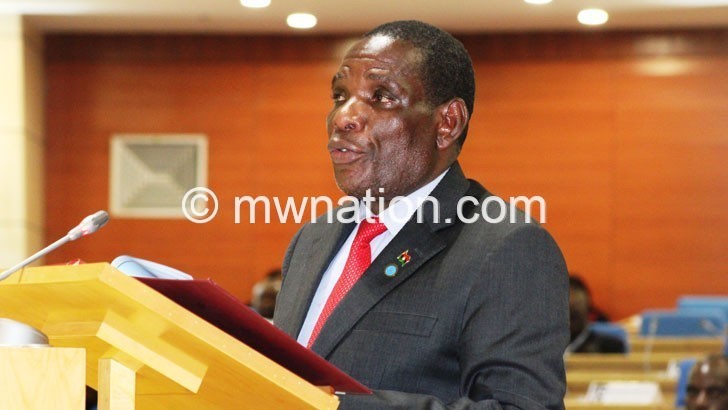Budget faces fresh scrutiny
Parliament resumed sitting in Lilongwe yesterday after two-week budget breakaway cluster sessions with main opposition parties casting doubt on the possibility of the fiscal plan achieving its targets, especially on revenue collection.
In their respective official responses, representatives of the main opposition Democratic Progressive Party (DPP) and United Democratic Front (UDF) said Minister of Finance and Economic Affairs Simplex Chithyola Banda’s targets are based on unrealistic macroeconomic projections.
The 2024/15 National Budget, built on the assumption that the economy will grow by 3.6 percent while inflation will moderate to 23.4 percent from the current 35 percent, projects domestic revenue at K4.55 trillion.
But in his response, DPP spokesperson on finance in Parliament Joseph Mwanamvekha said the projections are unlikely to be realised because they are based on an unrealistic economic growth trajectory.

He said the Malawi Revenue Authority (MRA) did not meet the revenue targets set in the 2023/24 Budget, having revised downwards the country’s revenue projections from K2.247 trillion to K2.198 trillion.
Mwanamvekha, who served as minister of Finance and Economic Planning and Development in the DPP administration between 2019 and 2020, said, as such, it would be said given that situation, it was unrealistic to expect the same institution to collect K3.26 trillion in the next fiscal year.
He said: “What this means is that MRA will continue to squeeze the already struggling taxpayers and MRA’s core values and basic principles of taxation such as fairness, efficiency and legitimate trade facilitation will be compromised.
“This approach in the end will cripple the private sector further, leading to low productivity and massive retrenchments.”
Mwanamvekha, who is Chiradzulu South member of Parliament (MP), further said the budget may not fulfil its goal of promoting economic recovery because it is not properly aligned with the Malawi 2063, the country’s growth and development strategy.
He said allocations to industrialisation and urbanisation, two of the three key pillars of the Malawi 2063 development strategy, are “not substantial enough” to power Malawi’s development agenda and expressed concern on whether the country’s economy can absorb the K1 trillion that donors pledged to the development budget.
In his contribution, United Democratic Front (UDF) spokesperson on finance in Parliament Misolo Mussa Kapichira expressed concern with our country’s economic status and its perceived capacity to undermine revenue collection.
He said the widening deficit in the budget, largely resulting from the government’s heavy appetite for domestic borrowing, will create financial hardships for ordinary Malawians as the government commits more resources to interest payments.
Kapichira, who is MP for Mangochi Malombe, said: “The projected interest payment for the 2024/25 financial fear of K1.5 trillion will be an unbearable burden on the taxpayer. It will especially be burdensome on the majority of poor Malawians, and this burden is expected to be prolonged.
“Domestic debt has become uncontrollable, the government’s appetite for it is insatiable.”
Interest payments are the largest budget item in the financial plan, dwarfing social sectors such as education, health, water and sanitation as well as critical sectors such as mining, tourism and agriculture.
To rectify the shortfalls in the budget, Kapichira urged the government to enhance efficiency in the private sector by dealing with the overpricing of contracts for goods and services, eliminating unproductive expenditure and allocating sufficient funds to growth sectors.
Reacting to the opposition responses, Leader of the House Richard Chimwendo Banda faulted the DPP for failing to present alternatives to the governing Tonse Alliance’s fiscal plan, but commended the UDF for suggesting workable solutions to the problems the party identified in the budget.
In an interview yesterday, governance and public expenditure tracking expert Mavuto Bamusi said there were some “serious problems” with the fiscal plan, particularly on its plan to continue borrowing from the domestic market to finance its deficits.
He said: “The government has to contain these expenditure overruns. We cannot keep running deficits when we are redirecting more funds to consumptive projects instead of development projects. This is fiscal suicide.
“Second, we cannot continue borrowing from the domestic and external markets because some of these markets are saturated.”
Chithyola Banda presented his maiden national budget in Parliament on February 23 before the House broke for two-week long cluster committee meetings.





